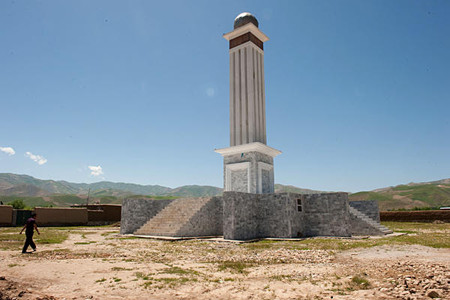By Ben Arnoldy

At Afghanistan's war crimes museum, built on the site of a mass grave, a large marble stone monument commemorates the deaths of thousands of peoplekilled in the past four decades of war. (ique Jaques/Special to The Christian Science Monitor)
Faizabad - He was a very tall man who wore outsized shoes and blue clothes. Sayed Husain taught history and prayed at the mosque, and for that he was thrown into jail in 1979. Educated people like him were the first to be rounded up when the communists came to power in 1978, kicking off Afghanistan's three decades of turmoil.
It wasn't until recently that Husaini's sister, Masooma, found those shoes among the remains of hundreds of people in a mass grave in northeastern Afghanistan, helping to close a dark chapter for the family.
At the mass grave site here in Faizabad sits Afghanistan's first war crimes museum, which opened in December. It has three small wings, one for each decade of bloodshed. The ‘80s wing is lined with framed photos of those who were buried with Husain, and a glass case with their unearthed effects: keys, prayer beads, a gold tooth, coins, a lime-green comb caked with dirt. The other two wings are emptier, highlighting the trouble Afghanistan faces in coming to terms with atrocities committed by those still jockeying for power.
Some of the perpetrators who came after the communists – warlords like Abdul Rashid Dostum and Gulbuddin Hekmatyar – were not as soundly defeated. Mr. Dostum remains an ally of the government, delivering many thousands of votes for President Hamid Karzai from his ethnic Uzbek followers. Mr. Hekmatyar, meanwhile, is now negotiating with the Karzai government after years of fighting alongside the Taliban.
"The situation in Afghanistan is still not fit to build such kinds of museums where the people come, and it's explained that this is [the victim of] Dostum or this is [the victim of] Gulbuddin Hekmatyar, because the security situation is not good," says Haq Dad Sharifi, the media representative for the Afghanistan Independent Human Rights Commission (AIHRC) office in Faizabad. "We collect the information and give it to the government. If the government has the power, they can do something with the information."
Even if the museum mainly highlights the war crimes that are safest to discuss, it still marks one of the first attempts to raise the issue and spark a conversation.
Visitors sometimes come to Sharifi's office in Faizabad asking why the atrocity happened. The office educates them about Afghanistan history as well as current rights to "make sure it doesn't happen again."
Burying the past
Not everyone agrees that focusing on history's dark corners should be a top priority – including the top official in Faizabad.
"Whenever some organization is going to have projects here or open an office here, they should focus on the culture – social and religious – of the people, not just focus on the bad things," says Baz Mohammad Ahmadi, governor of Badakhshan Province. He added that he didn't know much about the museum; he recently replaced the previous governor who backed it.
The Afghan government has given mixed messages over war crimes. Kabul passed a 2005 law to remove war criminals from power, ignored it, then quietly passed a 2007 law granting amnesty to all belligerents.
June’s peace jirga – or gathering of leaders to discuss how to deal with insurgents – worried human rights groups that it would encourage the government to pursue peace at the cost of justice. The delegates decided to only exclude from future peace negotiations those militants who were foreign or tied to foreign extremists.
"I wish there was a strong state and hard political will for justice in the country. I'm not looking [exclusively] for criminal justice, but some kind of healing process," says Sima Simar, chairperson for the AIHRC.
Ms. Simar says that her group will build more memorials to victims; it just opened one in Herat. She denies that AIHRC would shy away from highlighting the victims of current warlords: "For us, crime is crime, it doesn't matter who did it."
Closure for victims
For the families of the victims found in Faizabad's mass grave, the museum has given answers about the past and a renewed sense of sorrow.
Husaini remembers going to visit her brother in jail as a girl, bringing food for a family meal. He wasn't there. The guards told her that Husain had been transferred to Kabul. But later, when a rival faction came to power and emptied the Kabul prisons, Husain was still missing.
Hundreds of families around Faizabad came to believe the rumors that their loved ones had been thrown into the raging Kokcha River. But nobody could be sure until a builder discovered the mass grave in 2007 and the human rights commission began excavation work.
"It's good to know about their grave, at least we know where they are," says Husaini. "But it refreshes all our sorrow."
She says she isn't looking for justice because no one has the ability to give it and it won't bring her brother back. Other relatives of victims, however, come to see Sharifi in the Faizabad office looking for justice.
"We advise people that these things happened to everyone, but we are trying to make sure it doesn't happen in the future," says Sharifi. "They accept this because they don't have any other way.”



